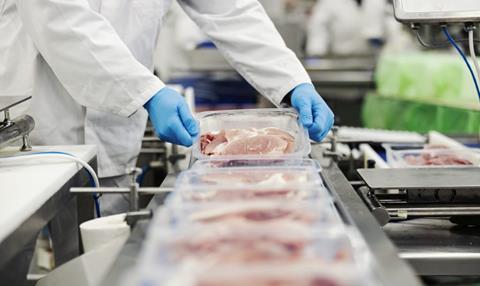Food industry stakeholders have joined Scotland Food & Drink in writing to Home Secretary James Cleverly MP, calling for Government to rethink proposed UK immigration rules.

The National Farmers' Union (NFU) Scotland has joined Quality Meat Scotland, Salmon Scotland, Seafood Scotland and Scottish Agricultural Organisation Society, along with Scotland Food & Drink, to write to Home Secretary James Cleverly MP.
The food industry partners joined with NFU Scotland's chief executive John Davidson in expressing "deep concern" about proposals to reduce net migration in the UK by increasing salary thresholds for skilled workers, alongside other planned measures.
In the letter, stakeholders wrote: "We think this is the wrong approach and ignores the essential role that overseas workers play in our industry, and our society. It is of course important to manage immigration effectively, and to ensure that communities continue to have the infrastructure and public services they need.
"It is equally vital to protect our economy and businesses, which already lack a sufficient pool of labour, to ensure communities across the UK have access to affordable, high quality food and drink and to protect an industry that employs hundreds of thousands of people and generates £15 billion a year in Scotland alone.
"We need to secure a resilient, productive food supply chain operating across the UK. This requires a large, diverse workforce. Raising the minimum salary threshold for skilled workers from overseas at a time of existing labour shortages will increase the threat to the stability of the whole supply chain, from primary production through to manufacturers, retail and hospitality providers."
The letter went on to say: "Our red meat sector has described the impact of your planned changes as 'the most significant threat we face in 2024' due to an ongoing shortage of butchers. They are not alone."
In 2023, Scotland Food & Drink conducted an industry survey into labour shortages where 92% of respondents across a range of sectors indicated that they were unable to find or attract enough suitable employees to meet their operational needs.
The letter continued: "Many began to explore recruiting skilled workers from overseas, even as costs rose. These additional changes will act as a deterrent, which may be the intended outcomes, but appears sadly short-sighted. We were particularly disappointed to see the Minister for Legal Migration and the Border refer to 'employers trying to recruit cheap labour from overseas at the expense of the British worker'. This is not a fair reflection of the situation.
"Our industry's reach from farm to fork, and the accompanying requirement for labour, is vast. We recruit and value thousands of skilled workers from overseas to help to maintain the quality and availability of our ingredients and products. Frankly, we could not do what we do without our overseas workers.
"We are proud to be a major employer, a major contributor to exports, and, in many ways, the engine for economic growth in Scotland."
Increased supply chain costs
NFU Scotland said that raising the skilled worker threshold to £38,700 will make the new minimum level higher than many of the vacant roles across the industry. It stated that this an the other changes planned will make it harder for businesses to recruit from overseas and for workers who might have considered applying.
The impact of the increased threshold will be increased labour shortages, said NFU Scotland, reduced profitability, higher prices and disruptions along the supply chain. It said that labour shortages were "already reducing productivity" and driving up operational costs, increasing food prices for consumers.
Stakeholders argued that at a time when the country is "still grappling with a challenging economic climate", including "stubbornly high" inflation, this could exacerbate cost-of-living concerns.
The letter concluded: "We urge the UK Government to reconsider these proposals. A positive approach to immigration is needed. One that recognises the essential role of overseas workers to fill labour shortages in our food and drink industry. We must ensure that immigration policies support the needs of businesses and the wider economy."

Proposed rules could spark another round of inflation - BMPA
The British Meat Processors Association (BMPA) responded to the proposed immigration rules, saying: "Government is plowing ahead with this seismic policy change without having produced any impact assessment of the damage it could cause. We calculate for our sector alone this could cost hundreds of millions of pounds, push up food inflation and render British exports much less competitive against our European counterparts.
"The £38,700 threshold to employ a recruit from overseas could cause havoc across factories, offices, pubs, restaurants, warehouses, call centres, shops… the list goes on. Existing UK workers will have the legal right to demand a similar salary uplift, completely distorting the standard market rate for jobs across the UK.
"Despite current competitive rates of pay that are well above the official Government ‘going rates’, companies (not just in the meat industry) find it impossible to fill all their vacancies from the pool of people in the UK, who are either not willing, not able, or not in the right location to take up these positions. So, we need migrants."
The BMPA continued, saying: "If companies continue to bring in overseas workers, British consumers will be hit with steeply rising costs from some of the key food, retail, hospitality and manufacturing sectors and the UK will become less competitive on the international export market.
"A more likely scenario is that it will go the other way. We’re hearing from businesses that filling these vacancies will become completely unviable under the new rule. If they can recruit neither British nor overseas workers they’re left with one choice – contract their business and reduce the amount of food they produce.
"This would be anti-growth for UK Plc and damaging for the economy. It would also dent our food security and spark fresh animal welfare issues as animals start backing-up on farms with not enough processing workers to handle the volume.
The BMPA concluded: "We're calling on policy makers to include butchers on the new Immigration Salary List which would reduce the salary floor to £30,960. This is still more than most British butchers are getting paid now, and is over 50% more than the official Government 'Going Rate' of £20,400 for a British worker."
This story was originally published on a previous version of the Meat Management website and so there may be some missing images and formatting issues.















